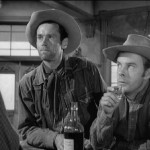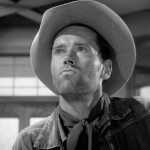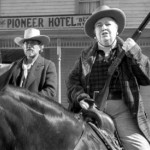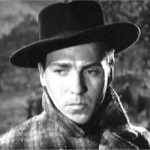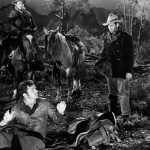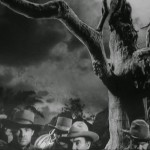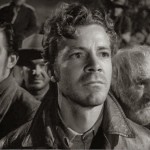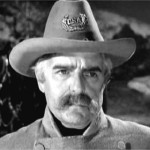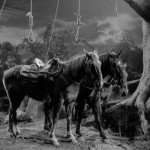
The Ox-Bow Incident – 1943
This was actually a very short nominee, coming in at an hour and 15 minutes. It starred Henry Fonda, Dana Andrews, Harry Morgan, and Frank Conroy. This film had a lot about it that was very well done. The casting was perfect, the plot had some substance, the subject matter was engaging, and both the actors and the director, William Wellman, did a fine job.
But there were also a few things about the film that I felt were lacking. The biggest thing for me was that, in the beginning, the characters were never introduced or developed, and the audience was just expected to pick things up as they happened. When the lead characters would do things, or not do things, as the case may be, I had no frame of reference to understand why, because I had no idea who they were. Another problem was that there was the sub-plot of a romance story, of sorts, that had nothing to do with the main plot, the “incident.” The film would have lost nothing if it had been left out.
Fonda plays the cowboy with a chip on his shoulder and a bottle of whiskey in his hand, Gil Carter. His friend, Art Croft is played by Harry Morgan, known to most people as Bill Gannon from the TV show Dragnet, and Sherman Potter from the TV show M*A*S*H. However, I found it interesting that he apparently didn’t have a big enough name to warrant giving him credit on most movie posters at the time, except for one that I found that got his name wrong, calling him Henry Morgan. Either way, he had a fairly prominent role.
Anyway, the two cowboys ride into town and go to the local saloon. The bartender serves up the alcohol and the prerequisite angry townsperson comes in and plays the jerk. A pointless fight ensues and Gil gets laid out with a bottle smashed over his head. Then the real plot starts and the film gets interesting.
Apparently, there have been some cattle thieves plaguing the town, but this time, they ended up murdering the cattle rancher. The men of the town are angry enough to form a lynching posse. They are idiots who want to punish someone, whether it is the guilty party or not. The sheriff cannot be found, so the deputy oversteps his bounds by deputizing the entire posse, giving the angry mob the appearance of legality. They go out looking for men to hang.
The leader of the mob is a former Confederate soldier, Major Tetley, played by Frank Conroy. They find three men camping who seem to have the murder victim’s cattle with them. To make a short story even shorter, they wake the three men up, accuse them, ignore their pleas of innocence, hang all three of them, and call it a day.
Of course, it is a bit more complex than that. The leader of the three men is Donald Martin, played by Dana Andrews. He did a fantastic job, flip-flopping back and forth between anger, confusion, fear, and sad resignation. Watching his performance, it was hard not to imagine how I would feel if I were in his character’s shoes. He was innocent, of course, but the crazed mob, especially Major Tetley, wouldn’t have believed him if he said the sky was blue.
The moral dilemma really became the driving force behind the plot as Donald asks to write a letter to his wife, explaining what was happening. When his letter was read, it became clear that he was innocent. But just before the hanging, Major Tetley gave anyone who didn’t agree with the farcical verdict the option to officially protest by stepping over a line. Gil and his friend Art, amongst others, did so, and escaped the guilt of innocent blood.
There was a relevant little sub-plot, involving the Major’s son Gerald, played by William Eythe, in which it becomes clear that he has spent his life being bullied by his father. During the lynching, he is forced to “be a man” and “do his part” by whipping one of the horses which will run out from under one of the hanging victims. It is like being forced to pull the switch of an electric chair. He can’t do it, and Major Tetley knocks him down before whipping the horse himself.
Of course, the sheriff shows up minutes after the deed is done, saying that the murder victim was actually still alive and the real cattle thieves have been apprehended. It made for a profound ending. But two more things happened to make it even more jarring. Major Tetley goes home and commits suicide, and Gil reads Martin’s letter to the men of the guilty mob. It speaks of how good men are capable of doing bad things, and how people who take the law into their own hands break all the laws of humanity. Take that Germans. Remember – we’re still in WWII.
And notice how I didn’t mention Gil’s ridiculous and vapid love story? Nothing was lost, was it?
